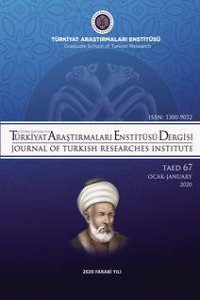Abstract
Türkiye Büyük Millet Meclisi, 23 Nisan 1920’de kurulmuştu. Bu sırada ülke, hem iç hem de dış tehdit altındaydı. Ülkenin birçok tarafı, İtilaf Devletlerinin işgaline uğramıştı ve bu, işin dış tehdit yönüydü. Meselenin en az onun kadar tehlikeli diğer bir yönü daha vardı ki o da olayın iç tehdit kısmıydı. Bu durum, İtilaf Devletlerinin destekleri doğrultusunda Anadolu’nun çeşitli bölgelerinde çıkarılan isyanlarla bir iç savaşa dönüştürülmek istenmişti.
Bu yüzden Anadolu’da çok ciddi bir iç güvenlik zafiyeti ortaya çıkmıştı. Eşkıyalık ve şekavet olaylarının önü alınamaz olmuştu. Bu kargaşa ve güvensizlik ortamının yaşanmasında özellikle asker firarilerinin payları büyüktü. Orduda, çok ciddi bir firar sorunu vardı. Mondros Mütarekesi’yle zaten iskelet kadrolara dönüştürülen ordu, bu firarlarla iyice erimekteydi. Asker firarileri, eşkıyalık ve şekavet olaylarının önemli bir parçası olmuştu. Meclis, bu sorunu çözmek için iç güvenlikle ilgili bazı kanunlar çıkardı. Ancak bu kanunlar, iç güvenlik ve bilhassa asker firarileri sorununun çözümünde istenilen sonucu aldıramamıştı. Nihayet Meclis, İstiklâl Mahkemelerinin de kuruluşuna zemin hazırlayacak olan Firariler Hakkında Kanun’u 11 Eylül 1920’de çıkarmış oldu. Ardından bu Kanun’u uygulamak için Millî Mücadele’nin I. devre İstiklâl Mahkemelerini kurdu. Kurulan bu mahkemelerden biri de Eskişehir İstiklâl Mahkemesiydi.
Bu çalışma, Eskişehir İstiklâl Mahkemesi karar defterine geçmiş bazı suç çeşitlerini değerlendirmeyi amaçlamıştır. Çalışmada, dönemin koşulları da dikkate alınarak o günkü suç sosyolojisinin anlaşılmasına bir nebze katkı sağlanması hedeflenmiştir.
References
- A. Arşivler Askeri Tarih ve Stratejik Etüt Dairesi Başkanlığı Arşivi (ATASE) Türkiye Cumhuriyeti Cumhurbaşkanlığı Devlet Arşivleri Başkanlığı Cumhuriyet Arşivi (BCA) B. Resmî Yayınlar ve Tutanaklar Düstur, Üçüncü Tertip, C.1, Başvekâlet Devlet Matbaası, Ankara, 1953. TBMM Kavanin Mecmuası, C.1, TBMM Matbaası, Ankara, 1943. TBMM ZC, 1. Devre, 1. İçtima Senesi, C.4, TBMM Basımevi, Ankara, 1981. TBMM GCZ, 1. Devre, 1. İçtima, C.1, Türkiye İş Bankası Kültür Yayınları, Ankara, 1985. TBMM GCZ, 1. Devre, 2. İçtima, C.2, Türkiye İş Bankası Kültür Yayınları, Ankara, 1985. İstiklâl Mahkemeleri, C.1, TBMM Kütüphane ve Arşiv Hizmetleri Başkanlığı Yayınları, Ankara, 2015. Eskişehir İstiklâl Mahkemesi, C.4, TBMM Kütüphane ve Arşiv Hizmetleri Başkanlığı Yayınları, Ankara, 2015. Isparta İstiklâl Mahkemesi, C.5, TBMM Kütüphane ve Arşiv Hizmetleri Başkanlığı Yayınları, Ankara, 2015. C. Süreli Yayınlar Gazeteler Açık Söz Hâkimiyet-i Milliye D. Kitaplar ATATÜRK, Kemal, Nutuk 1919-1927, (Haz. Zeynep Korkmaz), Atatürk Araştırma Merkezi, Ankara, 2009. AYBARS, Ergün, İstiklâl Mahkemeleri 1920-1923/1923-1927, Zeus Kitabevi, İzmir, 2006. BALCIOĞLU, Mustafa, Belgelerle Millî Mücadele Sırasında Anadolu’da Ayaklanmalar ve Merkez Ordusu, Yükseköğretim Kurulu Matbaası, Ankara, 1991. BAYAR, Celâl, Ben de Yazdım, C.II, Türkiye İş Bankası Kültür Yayınları, İstanbul, 2018. CEBESOY, Ali Fuat, Milli Mücadele Hatıraları, Temel Yayınları, İstanbul, 2010. ÇAVDAR, Tevfik, Millî Mücadele Başlarken Sayılarla “…Vaziyet ve Manzara-î Umumiye”, Milliyet Yayınları, Basım Yeri Yok, 1971.
Abstract
It was on 23 April 1920 that the Grand National Assembly of Turkey was founded. During those days, the country was under big internal and external threats. The external threat was that most parts of the country were occupied by the Entente States. Another aspect of the issue, equally dangerous with external threat, was internal threat. Internal threat was coming from the rebellions in various regions of Anatolia, where such actions were desired to be turned out to be a civil war with the support of the Entente States.
Thus a very serious national security weakness appeared in Anatolia. The banditry and brigandage cases became uncontrollable. Especially military deserters played a major role in the formation of such turmoil and insecure environment. The army suffered serious deserting problems. Turkish army, which had already been made of only main staff due to the agreement of the armistice of Montrose, was bleeding with these escapes. A serious amount of the banditry and brigandage cases belonged to military deserters. Turkish Assembly enacted some laws related to internal security to resolve this problem. However, these laws could not give the desired results for the solution of problems related to internal security and especially military deserters. In the end, the Assembly made a Law on Military Deserters on 11th September 1920, which also paved the way to the establishment of Independence Courts. Following this development, the Assembly established the 1st Term Independence Courts of Independence War to enact the mentioned Law. One of these Courts established was in Eskişehir.
The current study aimed to determine some crime types written in the agreement book of Independence Court in Eskişehir. In the study, considering the conditions of the period, it was also aimed to contribute, to some extent, to perception of crime sociology of the period.
References
- A. Arşivler Askeri Tarih ve Stratejik Etüt Dairesi Başkanlığı Arşivi (ATASE) Türkiye Cumhuriyeti Cumhurbaşkanlığı Devlet Arşivleri Başkanlığı Cumhuriyet Arşivi (BCA) B. Resmî Yayınlar ve Tutanaklar Düstur, Üçüncü Tertip, C.1, Başvekâlet Devlet Matbaası, Ankara, 1953. TBMM Kavanin Mecmuası, C.1, TBMM Matbaası, Ankara, 1943. TBMM ZC, 1. Devre, 1. İçtima Senesi, C.4, TBMM Basımevi, Ankara, 1981. TBMM GCZ, 1. Devre, 1. İçtima, C.1, Türkiye İş Bankası Kültür Yayınları, Ankara, 1985. TBMM GCZ, 1. Devre, 2. İçtima, C.2, Türkiye İş Bankası Kültür Yayınları, Ankara, 1985. İstiklâl Mahkemeleri, C.1, TBMM Kütüphane ve Arşiv Hizmetleri Başkanlığı Yayınları, Ankara, 2015. Eskişehir İstiklâl Mahkemesi, C.4, TBMM Kütüphane ve Arşiv Hizmetleri Başkanlığı Yayınları, Ankara, 2015. Isparta İstiklâl Mahkemesi, C.5, TBMM Kütüphane ve Arşiv Hizmetleri Başkanlığı Yayınları, Ankara, 2015. C. Süreli Yayınlar Gazeteler Açık Söz Hâkimiyet-i Milliye D. Kitaplar ATATÜRK, Kemal, Nutuk 1919-1927, (Haz. Zeynep Korkmaz), Atatürk Araştırma Merkezi, Ankara, 2009. AYBARS, Ergün, İstiklâl Mahkemeleri 1920-1923/1923-1927, Zeus Kitabevi, İzmir, 2006. BALCIOĞLU, Mustafa, Belgelerle Millî Mücadele Sırasında Anadolu’da Ayaklanmalar ve Merkez Ordusu, Yükseköğretim Kurulu Matbaası, Ankara, 1991. BAYAR, Celâl, Ben de Yazdım, C.II, Türkiye İş Bankası Kültür Yayınları, İstanbul, 2018. CEBESOY, Ali Fuat, Milli Mücadele Hatıraları, Temel Yayınları, İstanbul, 2010. ÇAVDAR, Tevfik, Millî Mücadele Başlarken Sayılarla “…Vaziyet ve Manzara-î Umumiye”, Milliyet Yayınları, Basım Yeri Yok, 1971.
Details
| Primary Language | Turkish |
|---|---|
| Subjects | Regional Studies |
| Journal Section | Makaleler |
| Authors | |
| Publication Date | January 31, 2020 |
| Published in Issue | Year 2020 Issue: 67 |


